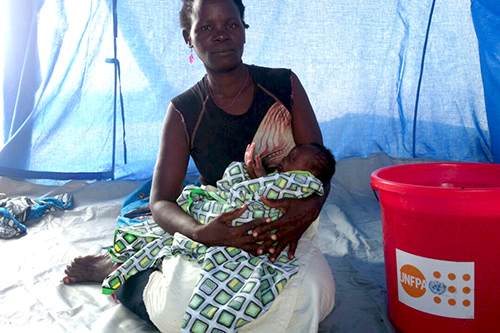News
Up a tree and eight months pregnant: A woman’s ordeal in the Malawi floods
- 23 April 2015
News
NSANJE, Malawi – Alimanda awoke to the roar of floodwater rushing into her home. She roused her four children and hurried them into a nearby tree, and, as the water rose around her, she struggled to climb into its branches. She was eight months pregnant.
Clinging to the trunk, Alimanda shouted into the darkness for help. Finally, a rescuer arrived by canoe. As they were ferried to safety, Alimanda watched as friends’ and relatives’ boats capsized in the raging waters.
The floods would take crops and livestock, wash away roads, and leave her community homeless. Yet for Aliminda, the ordeal was just beginning.
Amid the wreckage, and with four small children – ages 4, 5, 6 and 7 – in tow, she still had to find a way to safely give birth.
Delivering under a bush

After they were displaced that night, on 12 January, Alimanda’s family found themselves in the Marka Camp for flood survivors. Six weeks later, on 27 February, Alimanda felt labour pains.
It was midnight, and she had no means of transport, so Alimanda waited until early morning. Then, accompanied by two friends, she walked 5 km to the Ndamera Health Center.
They were almost at the health centre when Aliminda collapsed. Her friends carried her to a nearby bush, spread out a plastic sheet, and laid her on top. Moments later, she gave birth to a baby girl.
The friends then brought Alimanda and the baby to the health centre. A midwife attended to them, completing the delivery process. Both mother and daughter were safe and well.
Supporting women and girls
Hundreds of thousands of people have been affected by the flooding in Malawi. At the end of March, some 162,000 people remained displaced, according to reports from the Government and United Nations.
The situation for women and girls remains particularly difficult. Reduced access to adequate maternal health care puts pregnant women at higher risk. According to UNFPA estimates from mid-March, there are around 5,000 pregnant women among the displaced.
To address these needs, UNFPA and partners have delivered reproductive health kits to affected populations. These kits include medicines, equipment and supplies to support safe deliveries and handle complications, and even perform Caesarean section deliveries.
Clean delivery kits have also been made available to health staff and visibly pregnant women – including Alimanda, whose friends used the kit to help her deliver. Clean delivery kits contain a sterile plastic sheet, gloves, soap and other basic but lifesaving supplies, which can help ensure safe delivery even in the direst conditions.
UNFPA has also been hosting maternal health sessions in the displacement camps, raising awareness of the services available to pregnant women and new mothers.
"We are also distributing dignity kits to pregnant women, adolescent girls and lactating mothers,” said Jayne Chisenga, a UNFPA reproductive health coordinator. The dignity kits contain hygiene materials for women and girls, including sanitary napkins and soaps. “Women who are lactating also have problems to look after their general hygiene,” Ms. Chisenga said, “so we support them too."